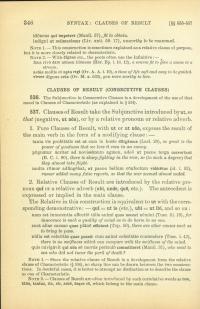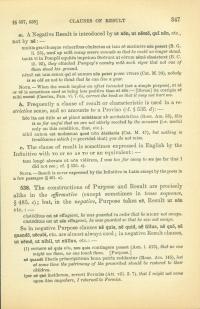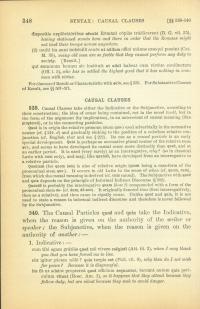Result Clauses
536. The subjunctive in consecutive clauses is a development of the use of that mood in clauses of characteristic (as explained in § 534).
537. Clauses of result take the subjunctive introduced by ut (so that)—negative, ut nōn—or by a relative pronoun or relative adverb.
-
Pure Clauses of Result, with ut or ut nōn, express the result of the main verb in the form of a modifying clause.
Tanta vīs probitātis est ut eam in hoste dīligāmus. (Lael. 29)
So great is the power of goodness that we love it even in an enemy.Pūgnātur ācriter ad novissimum agmen, adeō ut paene terga convertant. (B. C. 1.80)
There is sharp fighting in the rear, so (to such a degree) that they almost take flight.Multa rūmor adfingēbat, ut paene bellum cōnfectum vidērētur. (id. 1.53)
Rumor added many false reports, so that the war seemed almost ended. -
Relative Clauses of Result are introduced by the relative pronoun quī or a relative adverb (ubi, unde, quō, etc.). The antecedent is expressed or implied in the main clause. The relative in this construction is equivalent to ut with the corresponding demonstrative: quī = ut is (etc.), ubi = ut ibi, and so on.
nam est innocentia affectiō tālis animī quae noceat nēminī (Tusc. 3.16)
for innocence is such a quality of mind as to do harm to no onesunt aliae causae quae plānē efficiant (Top. 59)
there are other causes such as to bring to passNūlla est celeritās quae possit cum animī celeritāte contendere. (Tusc. 1.43)
There is no swiftness which can compare with the swiftness of the mind.Quis nāvigāvit quī nōn sē mortis perīculō committeret? (Manil. 31)
Who went to sea who did not incur the peril of death?Note 1— Since the Relative Clause of Result is a development from the Relative Clause of Characteristic (§ 534), no sharp line can be drawn between the two constructions. In doubtful cases, it is better to attempt no distinction or to describe the clause as one of characteristic.
Note 2— Clauses of result are often introduced by such correlative words as tam, tālis, tantus, ita, sīc, adeō, ūsque eō, which belong to the main clause.
a. A Negative result is introduced by ut nōn, ut nēmō, quī nōn, etc., not by nē.
multīs gravibusque vulneribus cōnfectus ut iam sē sustinēre non posset (B. G. 2.25)
used up with many severe wounds so that he could no longer stand.
Tantā vī in Pompêī equitēs impetum fēcērunt ut eōrum nēmō cōnsisteret. (B. C. 3.93)
They attacked Pompey's cavalry with such vigor that not one of them stood his ground.
Nēmō est tam senex quī sē annum nōn putet posse vīvere. (Cat. M. 24)
Nobody is so old as not to think that he can live a year.
Note— When the result implies an effect intended (not a simple purpose), ut nē or nē is sometimes used as being less positive than ut nōn.
[Librum] ita corrigās nē mihi noceat. (Caecina, Fam. 6.7.6)
Correct the book so that it may not hurt me.
b. Frequently a clause of result or characteristic is used in a restrictive sense, and so amounts to a proviso (cf. § 535.d).
Hōc ita est ūtile ut nē plānē inlūdāmur ab accūsātōribus. (Rosc. Am. 55)
This is so far useful that we are not utterly mocked by the accusers
(i.e. useful only on this condition, that, etc.).
Nihil autem est molestum quod nōn dēsīderēs. (Cat. M. 47)
But nothing is troublesome which (= provided that) you do not miss.
c. The clause of result is sometimes expressed in English by the infinitive with TO or SO AS TO or an equivalent.
Tam longē aberam ut nōn vidērem.
I was too far away to see
(so far that I did not see; cf. § 535.c).
Note— Result is never expressed by the infinitive in Latin except by the poets in a few passages (§ 461.a).
538. The constructions of purpose and result are precisely alike in the affirmative (except sometimes in tense sequence, § 485.c); but, in the negative, purpose takes nē, result ut nōn etc.
Cūstōdītus est nē effugeret.
he was guarded in order that he MIGHT not escape.
Cūstōdītus est ut nōn effugeret.
he was guarded so that he DID not escape.
So in negative purpose clauses nē quis, nē quid, nē ullus, nē quō, nē quandō, nēcubi, etc., are almost always used; in negative result clauses, ut nēmō, ut nihil, ut nūllus, etc.
-
cernere nē quis eōs, neu quis contingere posset (Aen. 1.413)
that no one might see them, no one touch them.
[Purpose]nē quandō līberīs prōscrīptōrum bona patria reddantur (Rosc. Am. 145)
lest at some time the patrimony of the proscribed should be restored to their childrenIpse nē quōinciderem, revertī Formiās. (Att. 8.3.7)
That I might not come upon him anywhere, I returned to Formiœ.dispositīs explōrātōribus nēcubi Rōmānī cōpiās trādūcerent (B. G. 7.35)
having stationed scouts here and there in order that the Romans might not lead their troops across anywhere -
Multī ita sunt imbēcillī senēs ut nūllum officī mūnus exsequī possint. (Cat. M. 35)
Many old men are so feeble that they cannot perform any duty to society.
[Result]quī summum bonum sīc īnstituit ut nihil habeat cum virtūte coniūnctum
who has so settled the highest good that it has nothing in common with virtue
For Clauses of Result or Characteristic with quīn, see § 559. For Substantive Clauses of Result, see §§ 567 - 571.



